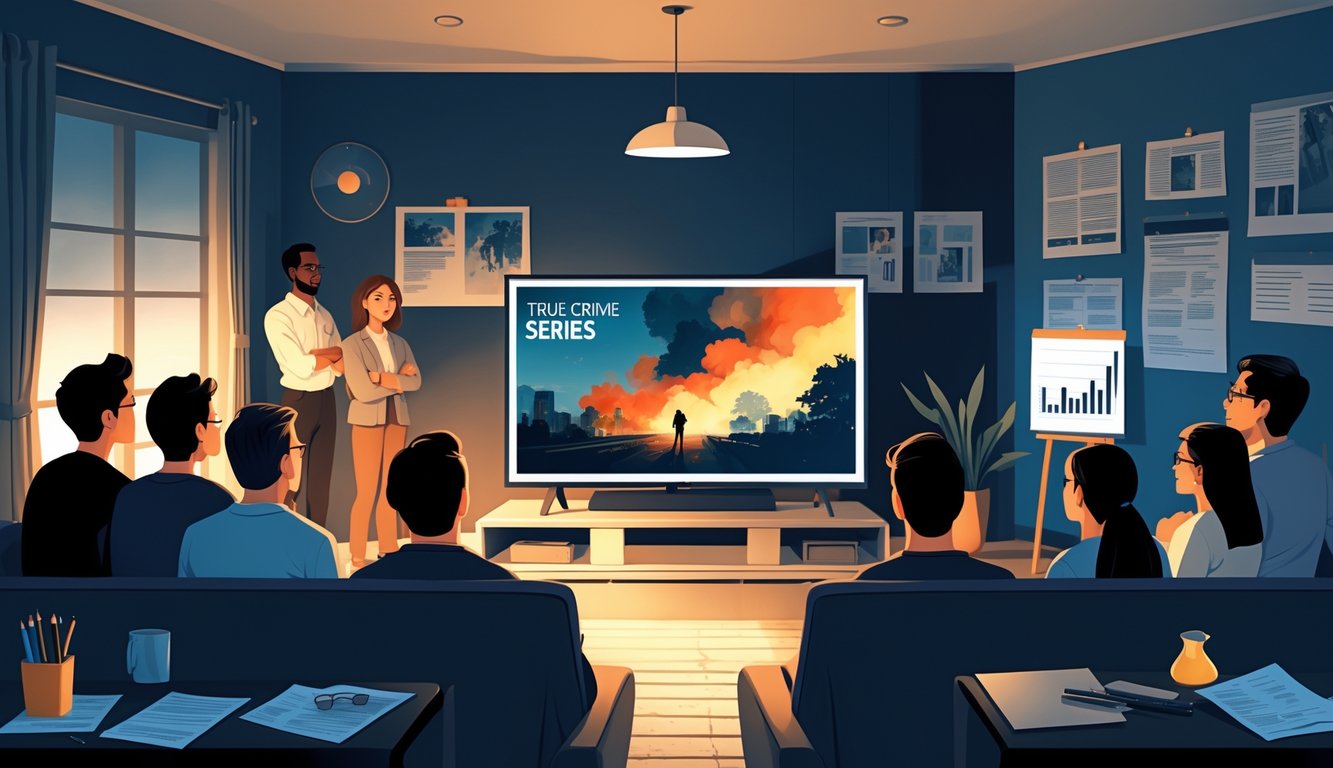
The Future of True Crime Series in Television
If you think the genre’s peaked, you’re kidding yourself. I’d bet my last snack it’s just mutating. Streaming keeps churning out new true crime with weird hybrids, global cases, and online mobs arguing about details every time Dateline drops.
Trends in Documentary and Investigative Formats
One minute I’m ranking outfits on “Fear City,” next I’m watching a three-part “feature film” that’s just a docuseries with movie music. The line between documentary and drama? Gone. “The Keepers” jumps from interviews to staged scenes so fast, I forget what’s real. Even Dateline’s trying to look cool with serialized episodes. Some analysis says new true crime digs into psychology and fallout, not just the crime—now you get real interviews, grainy security footage, and timelines that contradict themselves.
Honestly, the style changes are wild: one minute a voiceover expert, next minute a spreadsheet of bank records. The “big innovation”? Interactive episodes where viewers “solve” the case. Who asked for that? I’d love to see stats on how many people finish those versus bailing for a baking show halfway through.
Expanding Global Appeal
So, remember when “Unsolved Mysteries” just stuck to the US? Yeah, me neither. Netflix and the rest keep churning out true crime in every language I can’t pronounce—Spanish, Korean, Arabic, whatever. Nobody warned me I’d lose half a night on a Swedish bank heist doc, but, well, that’s exactly what happened. I swear, “crime documentaries” don’t even try to pretend they’re about local stuff anymore; suddenly, it’s all cross-border, and apparently, everyone’s watching—even if the only English is the subtitle font. There’s this industry breakdown calling audiences “insatiable” for international corruption, political intrigue, or those ancient cold cases. Sounds dramatic, but honestly? Feels accurate.
But here’s what gets weird—producers wedge in random local customs or parade shots of festivals for, what, cultural flavor? I don’t know. I see these quick, glossy montages of regional police uniforms and I’m just like, “Why is this here?” Maybe it helps with overseas ratings. I mean, these shows top charts in places I can’t even find on a map, and nobody ever admits to skipping the subtitled interviews, but the numbers? They’re wild. International stuff blows up, language barrier or not.
The Influence of Fan Communities
Reddit goes absolutely feral over “The Keepers.” I’ve seen threads with more research than the actual show. Forums just materialize overnight, and suddenly everyone’s an amateur detective, tossing out wild theories—sometimes even nailing it, but, like, where’s their trophy? Podcasts, YouTube breakdowns, all of it just stokes the obsession; I’m still haunted by that one crowd who built an entire timeline spreadsheet for “Fear City.” That’s not just fandom, that’s unpaid labor.
And now showrunners are straight-up pulling fans into the process. They drop Easter eggs, chase leads from Twitter, even let fans grill them in post-premiere Q&As. TV people used to ignore us, but now they’re practically crowdsourcing storylines. Loyalty means instant feedback, so if a Redditor posts a halfway decent alibi theory, next week’s episode magically “addresses” it. Is that democracy or just a desperate grab for engagement? Not sure, but it works—the rerun stats are ridiculous.
Frequently Asked Questions
People keep watching these murder docs and real-life whodunits, even when I’m convinced there’s nothing left to surprise me. Maybe it’s the constant tension or just the fact that, for some reason, these shows out-perform every drama for hours watched. Can’t explain it. I’ve tried.
What makes true crime shows so popular among viewers today?
Can you even scroll through Netflix without stumbling over some midnight confession or a half-baked Zodiac theory? I can’t. There’s this OnePoll survey (2,000 “fans,” whatever that means) saying 76% feel safer after binging these, or at least think they’ve learned how not to get murdered (see details). Not sure I buy it, but hey, if it helps them sleep.
My therapist threw around “vigilant engagement” like it’s a vitamin, then immediately switched gears and started ranting about copycat crimes and how these docs might actually do more good than harm. I don’t know. But suddenly, everyone’s chatting about cold cases like it’s sports scores.
What psychological elements make true crime series so engaging to audiences?
Honestly? My brain latches onto those cold-case voice-overs even though I forget half the names. Curiosity just keeps spinning, no matter how many studies say it’s adrenaline. The draw is that weird combo—fear and curiosity—so yeah, I’ll marathon six episodes and still not sleep.
The plots? Wildly complicated. Suspects swap every episode. Re-creations are sometimes so bad they’re good. I heard a Stanford psych PhD say “people crave answers to chaos,” but, like, when does anyone actually get answers? Never, as far as I can tell.
How do true crime series manage to maintain high viewership season after season?
It’s almost comical—there’s always a new case, always another docuseries, always more interviews. Netflix must have a warehouse of fake mustaches and drab lighting setups because the genre just keeps ballooning. The numbers back it up, so I guess that’s all that matters.
Formats barely budge, but somehow each rerun ropes in a fresh crowd who just found season four of that courtroom show everyone whispered about last year. Streaming numbers spike whenever there’s a real-life headline, like we’re all powered by collective panic and spoiler-filled group texts.
Are there any negative implications of consuming true crime content regularly?
My cousin swears she’s “immune to anxiety now,” but I’ve seen her triple-check the locks after every finale. So, yeah, side effects exist: sleep gets wrecked, you get jumpier, maybe even numb to it all. Psychologists keep debating if too much of this stuff drains empathy or just makes us more paranoid.
A 2022 research review basically asked if this stuff makes people safer or just stuck in a fear loop. One podcaster joked, “Nobody trusts their neighbors anymore,” and honestly, I’m not sure they’re wrong.
What demographic is most drawn to true crime stories, and why?
It’s not just women under 35, even though my book club’s group chat is 90% wild speculation about the latest killer doc. Market data and a BBC report say Gen Z, millennials, and bored parents are the main crowd, supposedly for “safety education”—as if another Ted Bundy doc will teach you street smarts.
Younger viewers love to say it’s about “practical awareness,” which cracks me up because most of these shows are so over-the-top compared to real life. Still, every new series drags in people way outside the usual Nielsen boxes. Go figure.
Can the consistent interest in true crime media be attributed to the ‘CSI Effect’?
Look, if you ever sat through law school exams, you already know—everyone thinks they’re one plot twist away from nailing a murder case. Blame those endless crime scene shows. They’re everywhere. Real defense attorneys (not the ones with perfect hair on TV) keep grumbling about this so-called ‘CSI Effect’—apparently, jurors now expect DNA on everything, like you can just swab a doorknob and solve a case in 45 minutes. Is that actually happening? Ugh, maybe. I skimmed some research from, what, the last ten years? It claims the effect messes with trial outcomes, but honestly, who even checks the sources?
Also, quick poll: does anyone actually know what “chain of custody” means, or are we all just nodding along because we’ve watched too many dramatic confession scenes? Three seasons in and I still can’t keep the legal jargon straight. And, not to derail this, but where did my old fingerprinting kit go? I swear I had it in a drawer.



